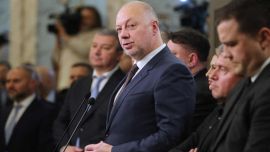Argentina’s Central Bank expects monthly inflation in August to have accelerated to almost double the pace of July after the government devalued the peso, two officials said in another sign the economy is quickly deteriorating.
The Central Bank estimates consumer prices will increase at least 10.6 percent from July, the fastest monthly rate since Argentina was coming out of hyperinflation more than three decades ago, the officials said, asking not to be named citing preliminary internal high frequency data and private online researchers like PriceStats.
Beef, fresh produce and medicine prices are seen as the biggest contributors to the acceleration, according to one of the people.
The August data, to be released by the country’s statistics agency on September 14, would dwarf the 6.3 percent monthly inflation that Argentina posted in July, confirming the significant impact on prices from an 18 percent peso devaluation announced by the government earlier in August.
Still, the projection by the BCRA, as Argentina’s Central Bank is known, stands below forecasts by private economists. Buenos Aires-based consultancy firms EcoLatina, EcoGo and Consultora Ledesma estimate the monthly inflation to be between 10.8 percent and 13 percent.
“We’re seeing a very elevated pass-through because this devaluation occurred in the context of high uncertainty, little government credibility and very few reserves,” Santiago Manoukian, research chief at EcoLatina, said.
A Central Bank spokesperson said the bank does not calculate its own inflation index nor confirm private estimates.
The administration of President Alberto Fernández devalued the peso’s official exchange rate on August 14 after suffering a bruising defeat in the country’s primary election. The measure, agreed with the International Monetary Fund as part of a troubled US$44-billion loan programme, was designed to help cash-strapped Argentina rebuild reserves by bringing the artificially stronger rate closer to those seen in the parallel market.
The Central Bank boosted its key interest rate by 21 percentage points to 118 percent following the devaluation. As part of the IMF agreement, Argentina has also agreed to maintain the key rate above inflation “to continue to support demand for peso assets,” according to an IMF statement by managing director Kristalina Georgieva.
The country will vote in a general election on October 22.
related news
by Manuela Tobias & Ignacio Olivera Doll, Bloomberg




















Comments